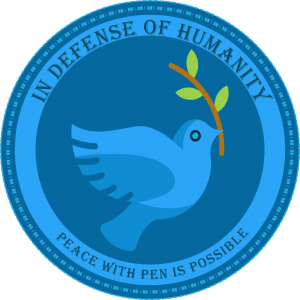The Tragic birth of Bangladesh
Pakistan came into being as a result of the partition of United India by the British Crown. Former United India was divided into two different countries and three distinct landmasses known as India and Pakistan (East & West). Both the countries were culturally and linguistically heterogeneous, Same was the case between the two wings of the newly born country of Pakistan. The only thing similar between both the countries was the religion of Islam. The western wing had a majority of Punjabi speaking people with minorities of Pushtuns, Sindhis, Balochs etc. While the eastern wing had a majority of Bengali speaking people.
Both wings of the newly created ideological state of Pakistan were divided from each other with the landmass of Pakistan’s original arch-enemy, India. There was a distance of approximately 1000 miles that separated both the wings. But one must keep in mind that the ideological distance was far more than the physical distance. Despite commonly perceived ideology, a shared history of a struggle for liberation, the geographical separation of East and West wings of Pakistan a long distance placed the rulers of Pakistan under tremendous pressure which as a result led both wings to go their own separate ways. Even if we minus India from the picture, who is considered to be the main villain and Pakistan’s number one enemy for its part in the events which lead to fall of Dhaka. Even before the falling apart of Pakistan, people of establishment in the Western wing considered the people of Eastern Wing as inferior due to the ethnological and linguistic difference. This false sense of superiority led the western wing to think that without then, Eastern Wing would not be able to survive. Same was the case with the other wing, as the people leading the East thought that it was their part of the country that earned major foreign exchange and that it is at her cost that economy of the West had been built.
We quite often come across a lot of anchorpersons and political analysts on national televisions trying to place the whole blame of this tragedy on one person or a single political actor. One has to be realistic and understand that tragedies like these aren’t the result of any one cause, there are always hundreds of underlying small factors that make up the political thunderstorms that result in historical havocs like these. Bengal fell in the fateful year of 1971 but the differences were much older, the roots of this breakup were older than Pakistan itself. In reality, East and West were two different entities at the time of inception of Pakistan, it was just the legal and military force that worked as national glue for twenty-four years. Some people argue that all this mayhem was inculcated after the declaration of Urdu as the national language of Pakistan[1], another factor was that the inequality in the pace of state-sponsored economic development in the East and West. “Social and economic justice was one of the basic demands of people and lack of complete satisfaction on that score has been the great cause of discontent”.[2] There were numerous key players in the tragedy of 1971 that subsequently lead to fall of Dhaka, but Mujib, Bhutto, Ayub, and Yahya may be considered the most prominent of them all.
The Capitalist Dictator
General Ayub Khan
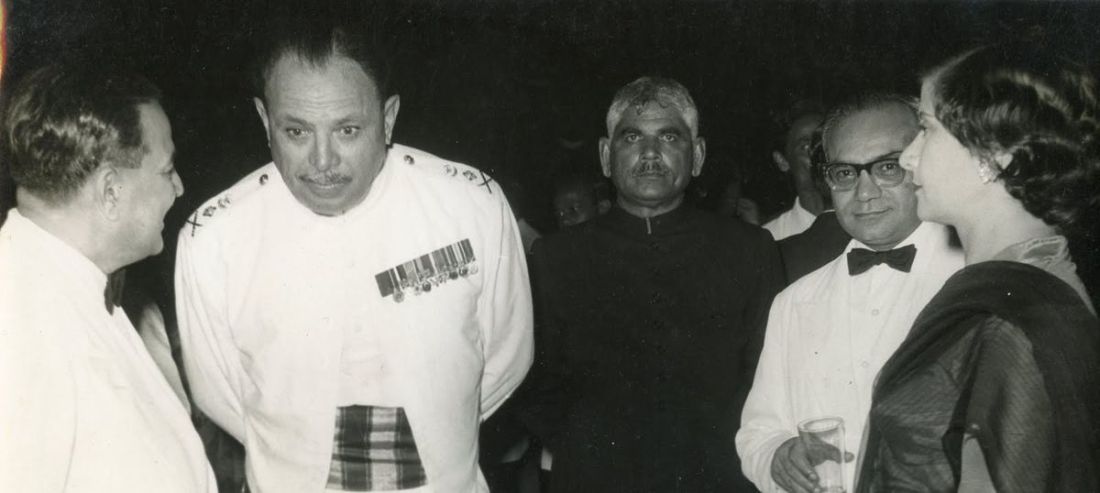
Pakistanis have a tendency to forget things and forgive people, especially the dead. Military dictators are among the lot who has gained the most from this habit of Pakistani nation. So is the case of General Ayub, who still has an army of repute defenders, in Khaki and suits, that continues to sing the praise of the Golden Modern age when the ‘General Saab’ once ruled the Muslim homeland. They keep reminiscing about the days when honey and milk flowed the rivers, and the economy was booming. The famous myth surrounding the Ayub’s junta is that of massive economic progress, brotherhood, and the emergence of Pakistan as Muslim world’s leader. However, the historical evidence of the time suggests otherwise.
The primary motive of General Ayub, as the historical documents suggest, was to sustain power and prolong his rule as his military generals sowed the seed for Bangladesh’s separation that came years later. The empowerment of right-wing religious fundamentalists just to secure a victory against Fatima Jinnah in the elections of 1965. The economic growth, which many cite as his singular achievement, promoted the income inequalities resulting in the rise of the 20 influential families who controlled the nation’s resources and amassed ill-gotten wealth, leaving the rest poor, hungry, and resentful. [3] From the beginning of his dictatorship, General Ayub felt annoyed by the public and democracy alike. He considered the general public to be illiterate and poor, to be trusted with the so-called adult franchise. As a result, he introduced the basic democracy system, where only a few thousand were to vote and of whom 95% elected the General as their leader. To the General, the politicians were solely responsible for the chaos inside the country and he openly called them traitors and accused them of bartering the country “for personal gains”. He swiftly jailed political leaders in East and West Pakistan. General Ayub’s nepotism of West Pakistan was one of the major causes that displeased East Pakistanis, who were the constant target of General Ayub’s ignorance, in a way that made them feel as if they were second-class citizens in a country for which they had fought. General Ayub placed three of the largest legacy projects, i.e., the construction of the new capital (Islamabad) and the two large hydel projects (Mangla & Tarbela) in West Pakistan.[4] The last nail in the coffin was General Ayub’s contempt for civil servants from the eastern wing as he never kept a confidante or a senior official in his government from East Pakistan.
The Drunken Despot
Yahya Khan
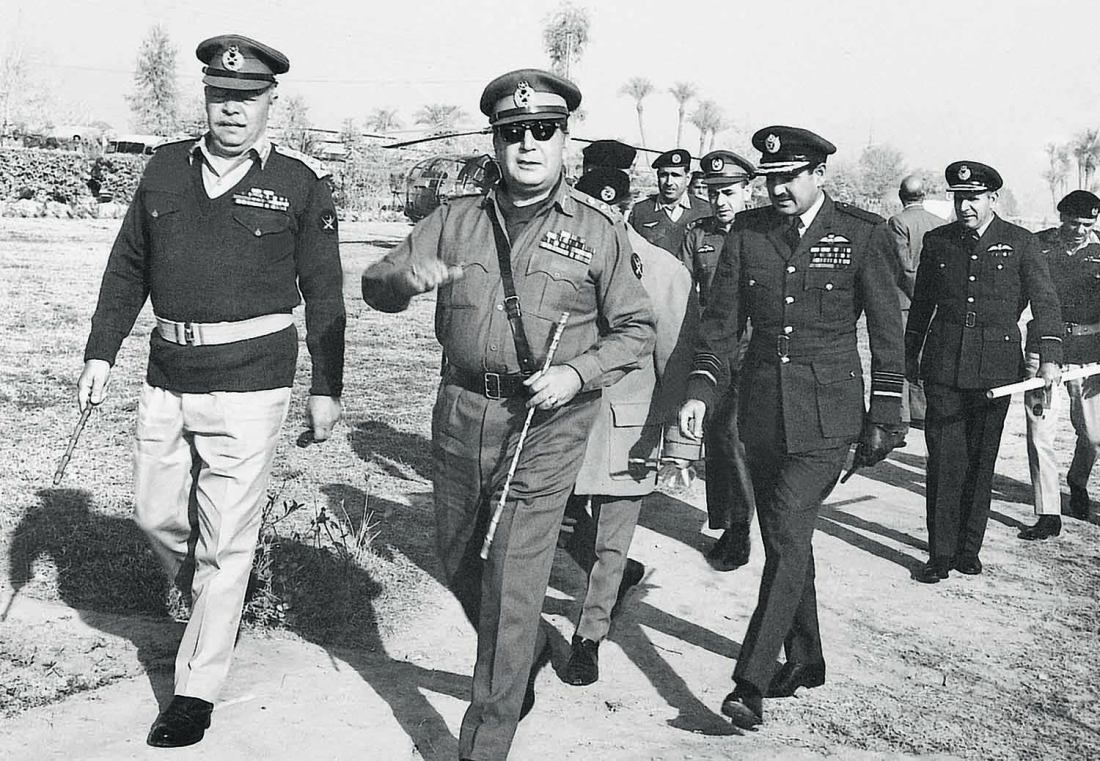
After Field Marshal Ayub Khan resigned, General Yahya Khan became the president and martial law administrator of Pakistan (United) on 25th March 1969. It was during his presidential era that a military and economic collapse of United Pakistan, the largest Muslim country on earth, which led to disintegration and consequently the birth of what is now known as Bangladesh and Pakistan. Rumor has it that like Bahadur Shah Zafar, “General Sahib” was more interested in music, arts, and poetry. It is further said that he had a special knack for booze and Madam Noor-e-Jehan.[5] Yahya played a central role in this disintegration, as like his predecessor, he held a contempt for people of the eastern wing of the country. In July 1969, he announced the country’s first general elections. The result came and Sheikh Mujeeb-ur-Rehman, the leader of Eastern Province, won the elections, while Zulfikar Ali Bhutto, a socialist, won the majority of votes in the western province. The transfer of powers was delayed by the military ruler which further escalated the problem. General Yahya Khan visited East Pakistan for the last time on 15 March 1971. On his return, he carefully instructed his military officers in Dhaka launch the infamous Operation Searchlight against the Bengali political movement for democracy. The Pakistan army went into murderous action against the protestors and political activists of the eastern wing.
For the Top Brass of the Country, the infamous Operation Searchlight was the only way to restore the center’s writ on the renegade eastern wing. This myopic policy of controlling the masses with military might, proved to be disastrous, as protests were now metamorphosing into an unending cycle of insurgency as Bengali members of the Pakistani military and para-military forces mutinied against the center and formed the Bangladesh Forces with absolute support of the civilian Bengalis of all classes. Operation Searchlight was considered by Bengali nationalists as an equivalent of Nazi Germany’s Holocaust against the Jews in the Second World War. General Yahya subsequently arrested Sheikh Mujib ur Rahman on charges of sedition and set up a special military tribunal to deal with Mujib’s case. Mujib was awarded the death sentence,[6] but President Yahya had to put the verdict into abeyance due to the Liberation War. Yahya’s suppression of Bengalis inculcated a civil war and subsequently, India too joined the war. The birth of Bangladesh as an independent republic was the result. He subsequently apologized for his historical blunders and voluntarily stepped down.
The Charming Populist
Zulfikar ali Bhutto
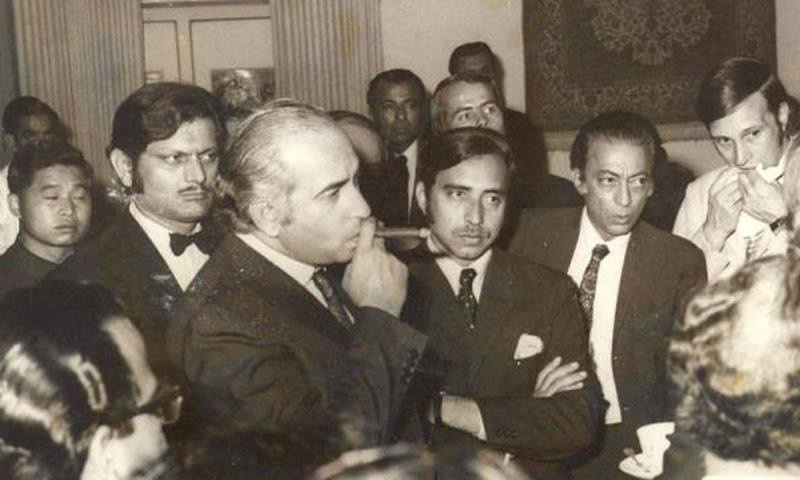
Zulfikar Ali Bhutto was a charismatic socialist populist leader of Pakistan and the founding father of the Pakistan Peoples’ Party. His fiery speeches and feisty body language ignite strong passions in the masses. To a large number of Pakistanis, Bhutto is Quaid e Awam or Leader of the People. But, at the same time, there are others who content that Bhutto was just a cunning charlatan who did more harm than good. The role of Bhutto in the breakup of United Pakistan is worth examining.
Bhutto, after the landslide victory of Sheikh Mujeeb ur Rehman in the 1970’s general election, made very provocative statements which played a central role in alienating Sheikh Mujeeb and his followers. The famous slogan “Udhar Tum, Idhar Hum” is also a brainchild of Zulfikar Ali Bhutto. Zulfiqar Ali Bhutto‘s party bagged 82 of the 138 seats in four provinces of the Western wing of Pakistan but he failed to win even a single seat in the Eastern Wing. It is also rumored that he even threatened the parliamentarians of Western Pakistan and Coerced them to boycott the inaugural session of government in Dhaka, East Pakistan.
Military action coupled with the stubbornness of Zulfikar Ali Bhutto on the matter of result of general elections added fuel to the already uncontrollable fire. Bhutto had many traits of narcissism, which led him to make very provocative statements against the elected leader of the east. There is no question about his brilliance but he did have megalomaniacal tendencies too. His lust for power, delusions of grandeur and obsession with power led to disastrous results for the country.
Bhutto considered himself to be the sole spokesman of the unity between both wings of the country, but in reality, he proved himself to be one of the main architects of separation. He was, from the very start, on the side of the military establishment, in the case of military action. He completely supported the military action against members of the separation group. Even his historic paper tearing act in the United Nations was later debunked by Jamsheed Markeer, a Pakistani Diplomat, in his book “Quiet Diplomacy”, as a bluff. Bhutto signed the very document of surrender the next day after the show. Historians suggest that Bhutto had played an important role in the breakup of Bangladesh to further his own objectives.
The Lingual Ultra-Nationalist
Sheikh Mujeeb-ur-Rehman
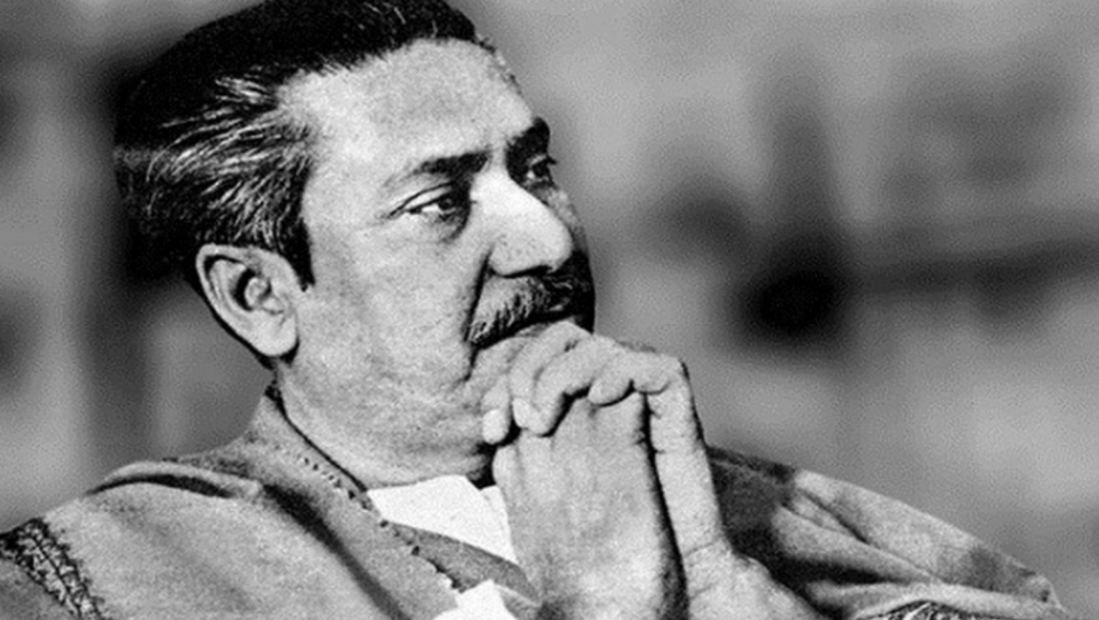
The Bangladeshi independence leader Sheikh Mujibur Rahman, created Bangladesh, successfully defeating Pakistani military occupation. Mujeeb received a landslide victory despite all the natural and artificial impediments in his way. These were the first free and fair elections, perhaps the only free and fair elections in the history of Pakistan. Despite the clear defeat, charming left-leaning politician Zulfikar Ali Bhutto, who had won the majority of National Assembly seats in the Western Wing, along with elements of Pakistani Civil-Military Establishment, could not digest the thought of a Bengali becoming prime minister. The traditional military and ruling elite saw India as Pakistan’s arch-enemy and considered Mujeeb-ur-Rahman as India’s Man. The Awami League felt the East would finally come out of the dark, whereas power brokers in the West saw the Awami League as an existential threat to their vested interests.
The hardest thing to digest for the Western Wing’s Establishment was the fact that Sheikh Mujibur Rahman, a Bengali had won an absolute majority of the National Assembly seats. General Yahya Khan’s announcement of the indefinite postponement of seating of the National Assembly and in effect annulment of the election results on 1st March 1971 was the final nail in the coffin. As a result, East Pakistanis took to the streets in protest against the announcement, which led to a large-scale province-wide civil disobedience movement which lasted several weeks. As a result, Yahya, Bhutto and other West Pakistani officials flew into the Eastern wing for talks of reconciliation. After several days it was reported that there was no breakthrough in the impasse between both wings.
This was followed by a bloody army crackdown on the night of March 25 of the residence of Sheikh Mujibur Rahman, he was put under arrest as a result. This was followed by heavy gunfire and arson of buildings all over Dhaka. Reliable sources reported “atrocities, summary executions, killings on Dhaka University campus. Acquaintances dead; others terrorized. Bodies on streets, fields, stacked in parks.”[7]
The war ended after a short period and Sheikh Mujeeb was released by Pakistani authorities as a result from captivity. His other colleagues, who had been arrested during the war were released in the early months of 1972. Mujeeb, along with his supporters and headed the newly established Bangladesh government in Dhaka.
Sharing the Blame
Conclusion
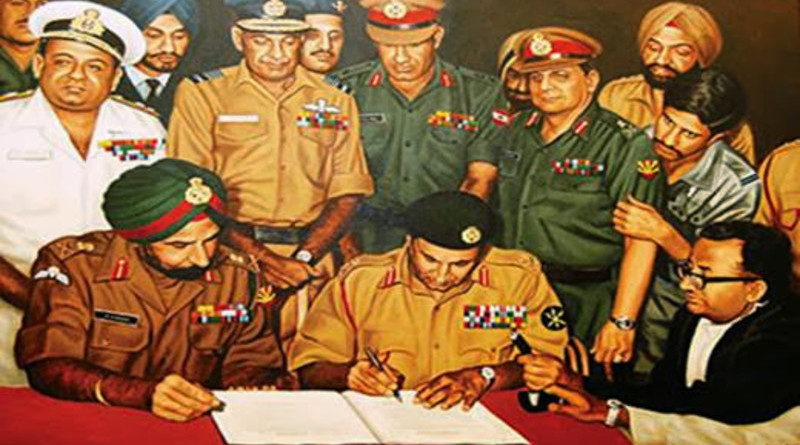
The polarization in today’s world forces everyone to take one camp or the other, but a middle ground is rarely used. People tend to opt for extreme point of views in every case, but the reality always happens to be somewhere in the middle. In Bangladesh’s war of liberation, people were either on the side of Pakistani Army or on the side of Sheikh Mujeeb’s Awami League, but somewhere in between all this, the truth was murdered brutally. US Senator Hiram Warren Johnson is purported to have said: ‘When war is declared, the truth is the first casualty’. This was more than true in the case of the War of 1971.
Pakistan’s original structure was doomed to collapse. Two separate linguistic and cultural entities, separated from each other by 1000 miles of a perceived arch-enemy’s land and based on an already faltering ideology of a pan-Islamic identity. In modern world’s context, this setup was impractical from the start. Despite all the common struggle for a Muslim Utopia, the ground realities could have never let this dream come true. Another big force in the separation of both countries was the continuous exploitation of Eastern Wing by the elites of Western Wing. The nonstop maltreatment of Bengalis at the hands of bureaucrats and military officials proved to be the final act of the tragedy. It has been 47 years since the country broke up, but the marks of war and the hatred in both countries against each other still lingers.
Primary Sources
- The Report of the Hamoodur Rehman Commission of Inquiry into the 1971 War – As Declassified by the Government of Pakistan
Vanguard Publishers – ISBN: 969-402-351-3 - Witness to Surrender – Siddiq Salik
Oxford University Press London
ISBN: 0-19-577264-4 - The Great Tragedy – Zulfikar Ali Bhutto
Classic Publishers Lahore
Secondary Sources
- forbes.com/sites/worldviews/2012/05/21/1971-rapes-bangladesh-cannot-hide-history/#35cbad2716df
- dawn.com/news/689976
- nation.com.pk/17-Dec-2016/fall-of-dhaka
- thenews.com.pk/jinnah-culture-language/#.WsNtuC5ubIU
- tanzeel.wordpress.com/2010/12/16/man-behind-the-fall-of-dhaka/
- https://tribune.com.pk/story/91669/1971-debacle-and-bhuttos-role/
- thedailystar.net/in-their-words-bhutto-and-mujib-december-1971-50468
- dawn.com/news/1151151
- countrystudies.us/bangladesh/15.htm
- passionpk.com/2013/03/general-ayub-khan-era-east-pakistan.html
- dawn.com/news/1293604
- nation.com.pk/16-Dec-2011/ayub-yahya-bhutto-mujib-played-part
- thefridaytimes.com/tft/the-fascinating-tale-of-general-rani/
- adst.org/2016/03/creating-bangladesh-the-triumph-and-tragedy-of-sheikh-mujib/
Citations
[1] http://www.thenews.com.pk/jinnah-culture-language/#.WsNtuC5ubIU
[2] https://nation.com.pk/17-Dec-2016/fall-of-dhaka
[3] https://www.dawn.com/news/1293604
[4] ibid
[5] http://www.thefridaytimes.com/tft/the-fascinating-tale-of-general-rani/
[6] http://www.thedailystar.net/op-ed/who-was-liar-yahya-or-bhutto-200383
[7] https://adst.org/2016/03/creating-bangladesh-the-triumph-and-tragedy-of-sheikh-mujib
[8] http://www.forbes.com/sites/worldviews/2012/05/21/1971-rapes-bangladesh-cannot-hide-history/
[9] https://en.wikipedia.org/wiki/Rape_during_the_Bangladesh_Liberation_War
